I have a scar on my right hand that starts at my pinky joint, winds down to my wrist, and wraps around to my palm — a casualty of an oil splashing incident involving zucchinis. It intersects with a different scar on my palm, from a cast iron skillet and some cornbread. The scars weren’t there six months ago, and neither were the scrapes across my knuckles from where I tripped and landed on clenched fists. They’re not my fault, the scrapes and scars, in the sense that it’s not my fault I got Covid last March and developed long term health issues from it. But they are my fault, in the sense that I now know I shouldn’t be cooking or even really walking around when I have brain fog, and I almost always have brain fog in the evening.
Either way, the wounds exist, and Stacy’s eyes flicked down to them as we entered round four of an argument that’d been going on all day. I wanted to do another load of laundry; she thought I shouldn’t be making so many trips up and down the stairs. I wanted to take out the recycling while she finished up work; she thought I should wait for her help because there were lots of bags and all that bending over was going to make me even dizzier than usual. I wanted to order and install a new showerhead; she thought I should listen to my dysautonomia doctor’s advice and not hold my hands up over my head unless I absolutely had to because my heart can’t make my blood beat up that high anymore. I wanted to carry a heavy appliance to a different place in the house; she thought the heavy appliance was fine just where it was.
“You keep second-guessing me!” I said. “It makes me feel like a stupid kid!”
Her eyes reflexively touched the new scars. I — not a stupid kid — shoved my hands into my pockets.
“I wouldn’t have to keep telling you to stop doing too much if you’d just stop doing too much!” Stacy protested.
I — again, not a stupid kid — stomped my foot. “You need to let me figure out how much is too much by myself!”
“You have!” Stacy said, tears gathering in her eyes. “You have figured it out!”
A few days earlier, I’d forgotten to put on my compression socks, and my Liquid IV shipment was late so I was using substandard electrolyte therapy, and I’d tried to watch MSNBC while I was working to keep up with the relentless cycle of bad news, which completely overloaded my sensory processing and fried my brain — and by the afternoon I was curled up under a pile of blankets, sweating and shivering and too fatigued to lift my head, wheezing for breath, muscles in knots, a migraine stabbing behind my left eye. Stacy brought me dinner in bed, kissed my sweaty forehead, said we’d order my favorite juice from the juice place as soon as it opened up in the morning.
I hadn’t figured it out. Not really.
Stacy and I decided to get married the same way we’ve decided every other major thing in our relationship: like it was the continuation of a conversation we’d always been having. It was one of those spring Sundays in New York City that makes everyone fall in love with each other and the city all over again. Cherry blossoms and dogwood trees and honeysuckles somehow; glowing cornflower skies; warm sun, cool breeze. Before I got sick. Before we’d ever even heard of Covid. Before the word “pandemic” was anything more than the setup for a zombie video game. Years ago, really. A lifetime.
For brunch, I’d ordered something savory and she’d ordered something sweet, and we’d split it, which has always been our way. We were talking about — oh, I don’t know: work or books or the Miami Dolphins or some other brunch we’d had at some other time and place or that vacation when the bakery owner in Maine told her she had expensive taste because she ordered two pastries and she never got over it. She was wearing a blue and black plaid shirt and a bright yellow snapback — because she hates being “too matchy-matchy” — and her nose was pink because there was still a chill in the air, but she was drinking some coffee thing with whisky in it and her insides seemed toasty. I thought, “How can she make my heart feel like bursting even after all this time?” I thought, “How are her opinions still so fascinating to me?” I thought, “But only those lovers who didn’t choose at all, but were, as it were, chosen by something invisible and powerful and uncontrollable and beautiful…”
I blurted out, “We should get married.” She stopped talking and grinned and said, “Well, yes, obviously.”
And that was that.
The night before our first blizzard this year, Stacy and I realized I wouldn’t be able to shovel snow anymore. I’ve always shoveled our snow because I like chores and exercise and sore muscles and I’m a Georgia girl, so the entire concept of snow remains a novel miracle to me. Stacy said she’d handle the shoveling, so I decided, vehemently, that my job would be putting out the ice melter. I could just shuffle behind her at my own pace with one little scoop at a time and spread it out and feel useful — no, be useful. And so it baffled me when, the night before the second blizzard, Stacy asked me not once, not twice, but three times what I was doing as I prepared a new bucket of ice melter for use.
Why was I tromping out into the backyard in the snow at 9:00 pm?
Why was I rummaging around in my toolbox at 9:15 pm?
Why in the WORLD was I lugging a 50-pound tub of ice melter through the living room at 9:30 pm?
The answers were: Shoveling out an unopened bucket of ice melter, looking for my pliers to open the bucket, putting the bucket in the stairwell so it’d be ready for me to do my job in the morning. But it was after 9:00 p.m., which is the time when words start falling out of my head in earnest, because of the brain fog and inflammation and who even knows what else, so I just kind of grunted at every question she asked.
When I finished, she was sitting on the couch scowling.
“You know I can’t articulate what I’m doing when I’m doing it anymore! It’s too hard for me! My brain can’t handle it!,” I snapped.
She said, “Then can you please stop and say that, instead of getting stompier and stompier when I express my valid worry about you pushing yourself too hard and too far.”
“I can’t do it,” I said. “I can’t do two things at once!”
She stood up. “That’s not what I’m asking for!”
“You are!” I could feel my hands clenching at my side. “You’re not respecting my… my… limitations!”
It was probably the most unfair thing I’ve ever said to her, to anyone, in my life. In the whole time I’d been sick, almost an entire year by then, she’d never — not once — questioned how I felt or what I was unable to do.
When Long Covid didn’t even have a name, when we’d never heard of Dysautonomia or POTs or Mast Cell Activation Syndrome or Pernicious Anemia, when every doctor I spoke to told me I just had anxiety, when the spouses and siblings and bosses and parents of people in the online Long Covid support groups I’m in didn’t believe a word of what their family and employees were telling them, when I couldn’t get out of bed, when I literally couldn’t lift my head to eat, when my nighttime adrenaline surges were so bad I would wake up crying out in terror with my legs in trembling motion like my body was trying to run away from a bear, when the doctors who might be able to help me were all out of pocket, when I couldn’t talk, when I couldn’t walk, when I couldn’t remember the most basic words for the foods I could stomach, when she was juggling the expectations of huge clients for work while taking care of our four cats and everything in our house while making every meal I needed and washing my clothes and sitting up with me at night to literally shake off the adrenaline spikes — she never, ever, ever stopped respecting or tending to my every need.
Her face was stricken when she said, “Please don’t yell at me.”
I yelled, “I’m not yelling!”
She said, “You’re so angry.”
I said, “Of course I’m angry!”
“Yes,” she agreed quietly. “Of course you’re angry. You have every right in the world to be full of anger and pain and outrage — but I mean with me.”
I wasn’t angry at her. I was angry at the world, at all the people who could have warned us to wear masks when they knew we should be wearing masks, at all the people who came to New York City from places that were in Covid crises just because they weren’t experiencing symptoms, at the government that gaslit us, at the doctors who ignored me and wrote me off, at the people who were — even now — expressing callous disregard for the health and safety of other people, at my body, at my brain, at myself. Why. Why couldn’t I just remove the lid from a bucket of ice melter while simply explaining that I was removing the lid from a bucket of ice melter? “I need pliers to take off this lid so I can use it in the morning.” How hard was that? Why was everything so confusing and impossible?
“You don’t snap at me,” she said. “You’ve never snapped at me. You don’t raise your voice at me. You’ve never raised your voice at me. This new you is—”
I felt my jaw drop like a cartoon character, and whatever she saw in my face and my posture made her stop talking.
“You think I’m a different person now.”
“No!” she stepped toward me. “No, not a different person. Just this one thing. Your anger being so close to the surface.”
“You said ‘new you.'”
She stepped even closer. “Heather. Just this one thing. You are still you. Heather, listen to me. Look at me. You are still you.”
I never had any plans or dreams or visions of getting married. When I was a kid and my friends played house, I pretended my husband had been lost at sea. When we played wedding, I played “drunk Aunt Anne.” I never imagined the dress, the church, the flowers, the bridesmaids, and I certainly never imagined the groom. And neither did Stacy. Long before we decided we should get married, we already felt married. And when we did decide to get married, it basically just seemed like endless paperwork and an expensive party that would inevitably stress the heck out of both of us and leave at least two-thirds of the people we knew in tears, one way or another. If any other weddings I’d ever been a part of were any indication, at least.
Being married to Stacy seemed like the greatest thing. Calling her my “wife,” wearing a wedding band, not having to explain that I wasn’t actually single every time I checked off the emergency contact information at a new doctor. But having a wedding was impossibly daunting.
About a month into New York City’s Covid lockdown, Stacy and I caught a segment on NY1 where Governor Cuomo explained a new executive order called Project Cupid that would allow couples to get married over Zoom. Just you and your fiance on one end, your officiant and family and friends all in different places on the other end, and — boom! — you’d be married. For really real married. We turned to each other at the exact same time with the exact same look on our face. She said, “Are we gonna do it?” I said, “We are gonna do it!”
All those years of not planning our wedding, but before the night was over, we ordered wedding rings, a matching bow tie and regular tie, a new suit for me. We browsed delivery cakes for hours. I wrote my vows. We told our family and close friends. “Get ready,” we said, “It’s finally happening.” Wife, we kept saying. Wife, wife, wife.
And then my Long Covid kicked in.
I knew I was a new person nearly a year into Long Covid. My body didn’t work the same. My brain didn’t work the same. My relationships with most of my family and friends had all shifted dramatically, as had my work, and my relationship to my work, and my relationship with everything my body used to be able to do. I couldn’t play Dungeons and Dragons with my closest friends, I couldn’t ride my bike, I couldn’t even really leave my house to walk farther than a block. I got even worse at returning texts and emails and sometimes I’d forget I’d even interacted with someone I loved half an hour after it happened.
But there were other things too. At some point, I’d completely let go of the idea that I had anything to prove to anyone about my writing; and I wrote some of the best pieces of my career. I started finding immense, almost childlike joy in the smallest things: the softness of my sheets against my legs, my one cup of steamy frothy coffee a week, the weight of a purring cat on my shoulder or in my lap, the brush of Stacy’s fingertips against my neck as she scooted past my desk during the day, and the gentle caress of her kiss on my cheek and temple and forehead and chin and nose at night. Sitting together on the couch, snuggled under the same blanket, watching movies and TV, night after night, like we’d never done in ten years of our relationship because I’d stopped go-go-going. Wholly abandoning anyone else’s ideas for what I should be doing in any area of my life. I was, inexplicably, and in ways I’d never experienced content and deeply happy.
I felt like if I kept moving when I could, kept writing when I could, kept connecting with people I love when I could, kept finding ways to be grateful, kept chasing answers with specialists, kept trying new treatments, I could outrun the despair that was chasing me. When Stacy said there was a new me, I knew she was right, which meant there was also an old me — and I hadn’t even begun to grieve her.
I’d only cried two times since getting sick with Covid — once after I’d had to quit my D&D game, and once when I called my sister because I was getting scared of how sad I was when I couldn’t get out of the bed — but that night, the tears started in the corner of my eyes, trickled down my face, and when I tasted them on my lips, the dam of my despair broke open and I cried like I had never cried in my life. Choking, sloppy, desperate, wailing, hyperventilating tears that seemed to be coming from a deep place inside me I’d never even accessed before. My entire body shook uncontrollably. And I finally said the things I never said before: I wish I hadn’t gotten sick. Why did I get sick? Why me? Why did I not get better? Why did this happen to me? Why did this happen to me?
Stacy’s hand was on my back, my cheek, my thigh, my arm, my hand. “I love you,” she said, over and over. “I love you.”
Our wedding plans went on hold when I found myself unable to get out of bed. Weeks and months upon end, no answers from doctors, every day a new terrifying manifestation of Long Covid in my body. My wedding suit and tie hung on our bedroom door, but it eventually became apparent that it was just taking up space and needed to go into the closet. When I finally started getting diagnoses and working out treatments for the various syndromes that were making up my prolonged Covid experience, I didn’t bring up our wedding. I told myself it was because I didn’t know, from day to day, what my body was going to do. There was no way to plan to have a Zoom on a certain day at a certain time because there was no way to know whether or not I’d even be mobile on that day.
And that was true — but the other truth was that I didn’t want Stacy to feel forced to marry me when there was a very real chance I would never be fully well again. I wanted her to have an out, even if the out was just me never bringing it up again. I wasn’t the same as when we met, when we decided to get married, when we bought those matching ties.
I put my wedding ring on the day FedEx delivered it, and maybe that was enough.
One night, after a very hard day of pain and brain fog and being unable to breathe, Stacy said, into the dark of our bedroom, “I have always wanted to marry you. That hasn’t changed, you know. It will never change.”
We got married sitting down because I can only stand for a few minutes at a time. A Zoom ceremony with our family and officiant on one end, and us in our living room. I had intended to wear the regular tie, and Stacy had intended to wear the bow tie, but I got so tuckered out tying the bow tie on me so I could tie it on her that I had to keep it on and she ended up in the regular tie.
Stacy started crying the second she started saying her vows, and so I started crying too. “I promise I will always love and support you and celebrate you and be here for you, for whatever you may need in our lives,” she said. “I hope to prove to you again and again that I will do anything for you. Any thing, any time, for any reason — or no reason at all.”
I said, “I promise to respect and celebrate all the things that make you you, apart from me and you: Your creative passions and artistic ambitions, every quirk that has become so dear to me, your career drive and your ethos of endless generosity, your commitment to what’s good and just, your ferocity of spirit, your tender heart.”
Our officiant walked us through more traditional vows when we were exchanging rings. For better, for worse, for richer, for poorer. Stacy squeezed my hand and looked from my ring finger into my eyes. In sickness and in health.
I kissed her ring finger and repeated it back. In sickness and in health.
While our family watched, our officiant pronounced us married. I wore a suit and Stacy wore a suit. We were girlfriends for ten years, brides for ten minutes, and then we were wives. One string of Christmas lights draped over the bookshelf and my childhood teddy bear as decoration; our cats watching on; the only wedding either of us had ever imagined.
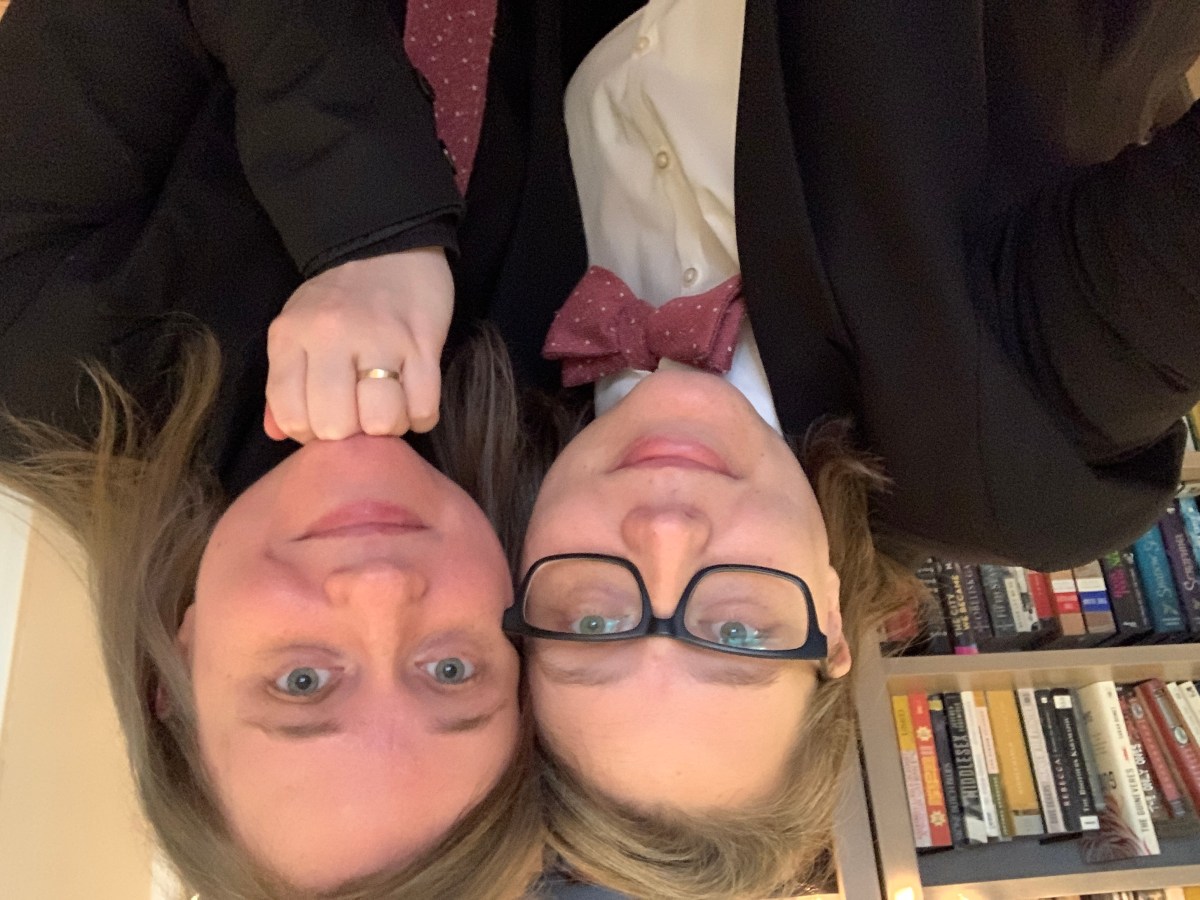
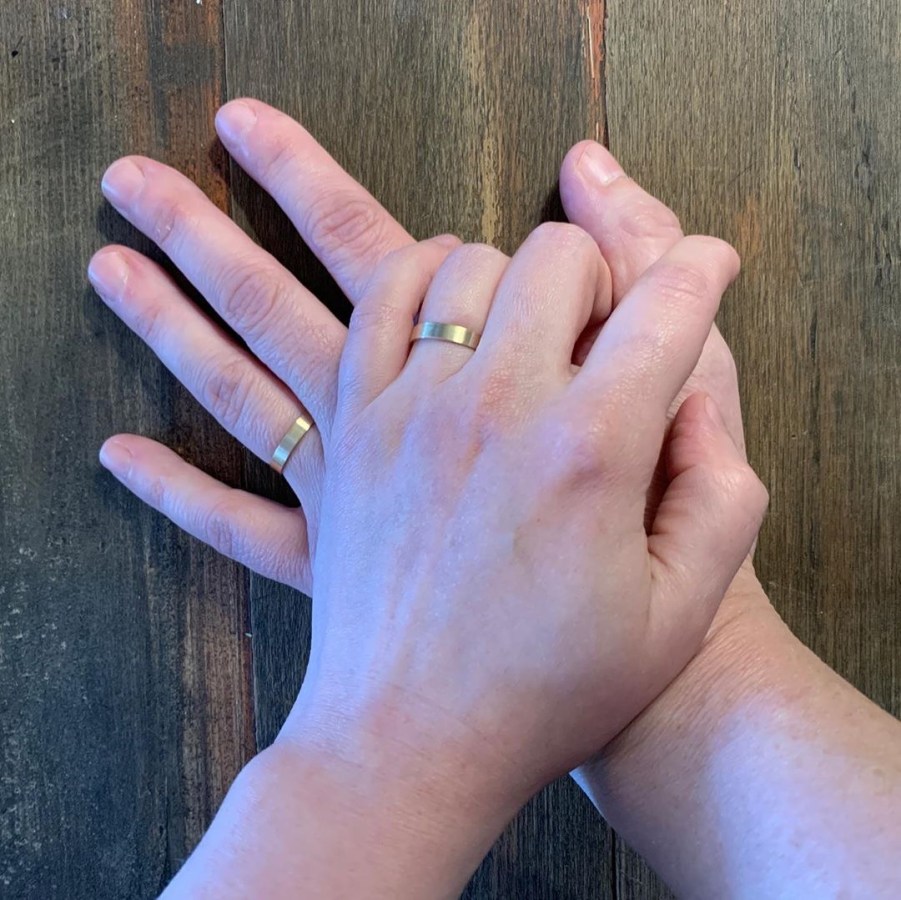
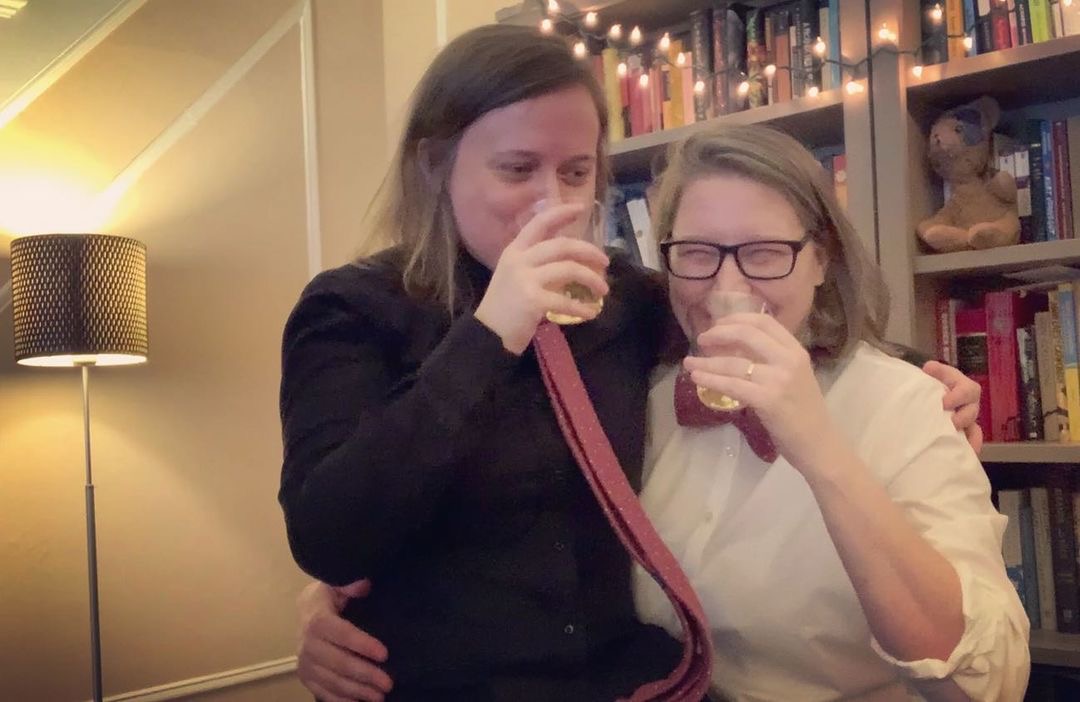
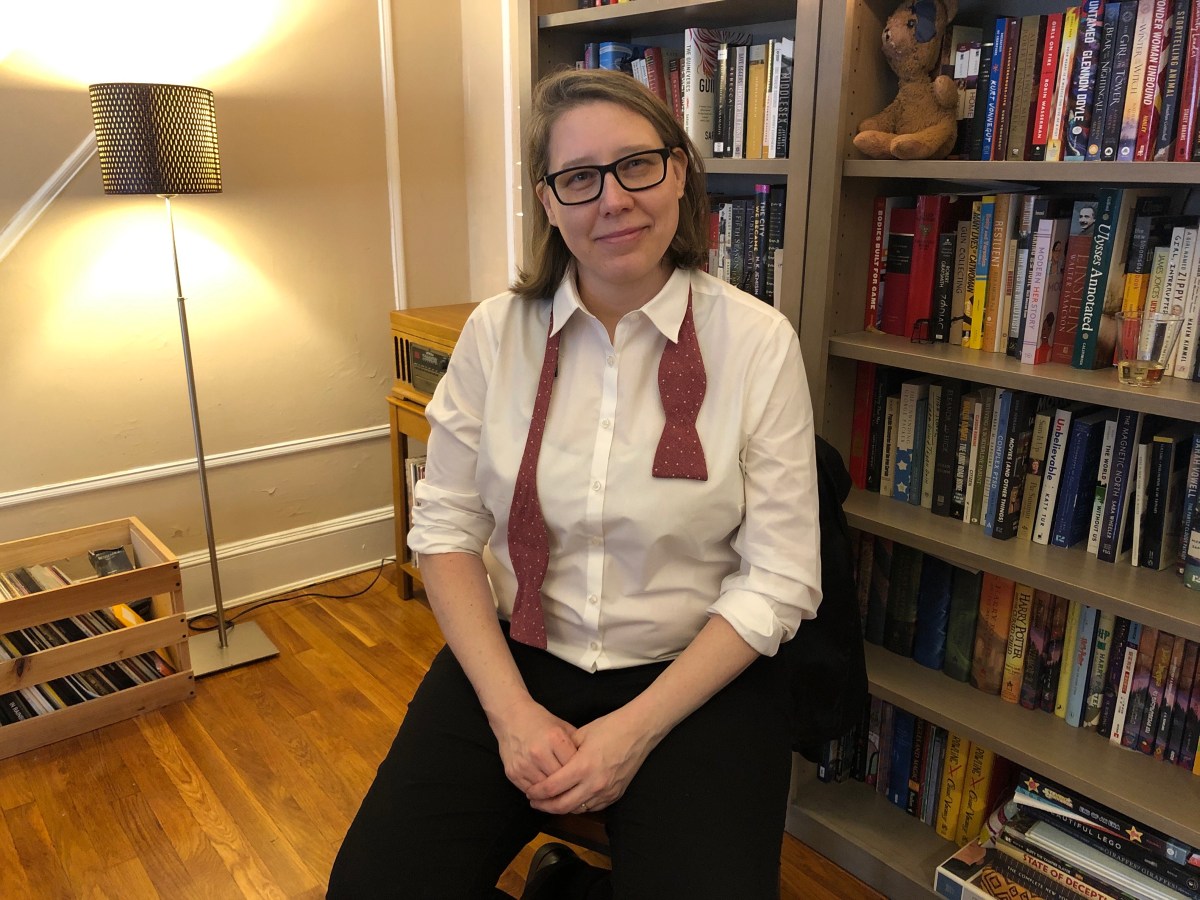
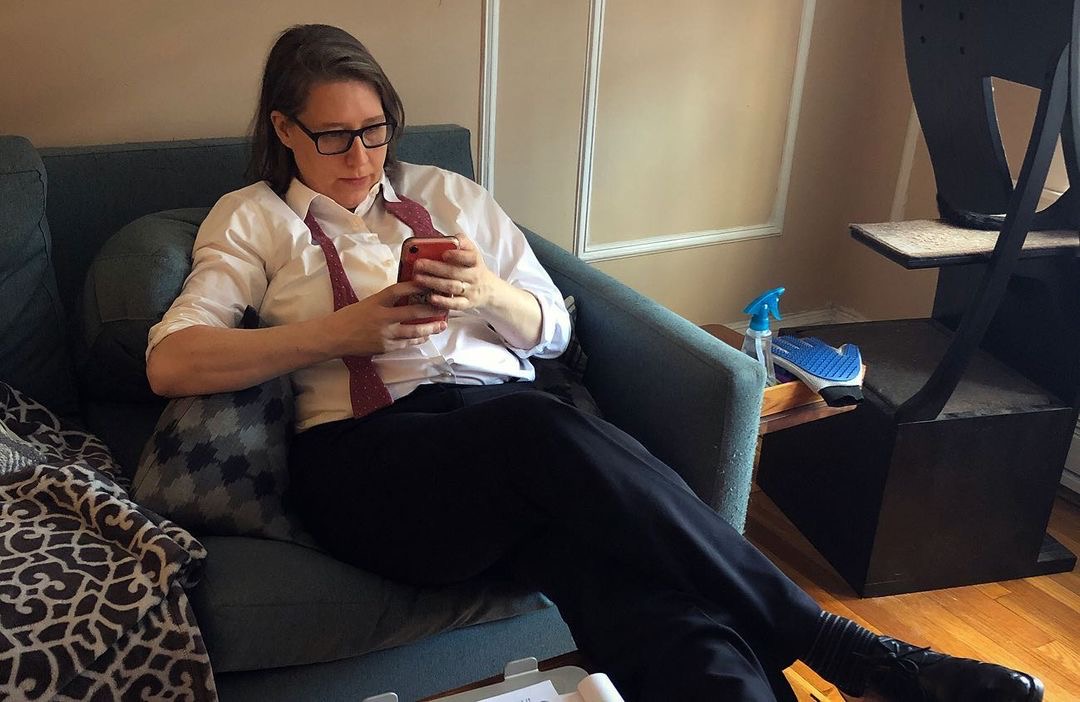
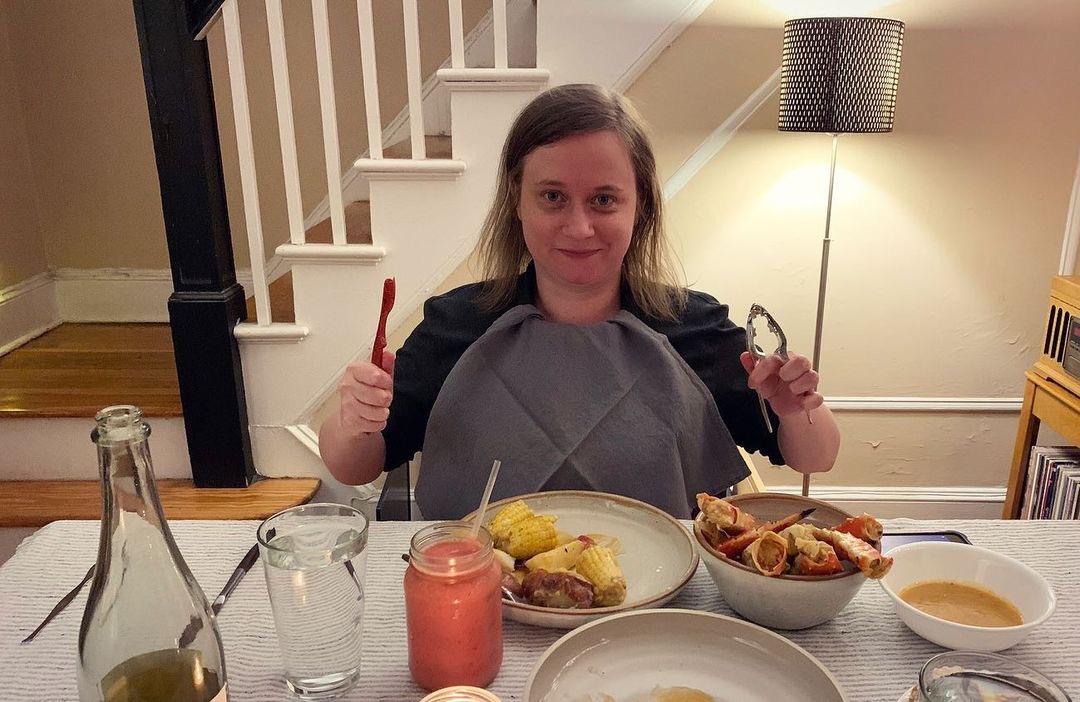
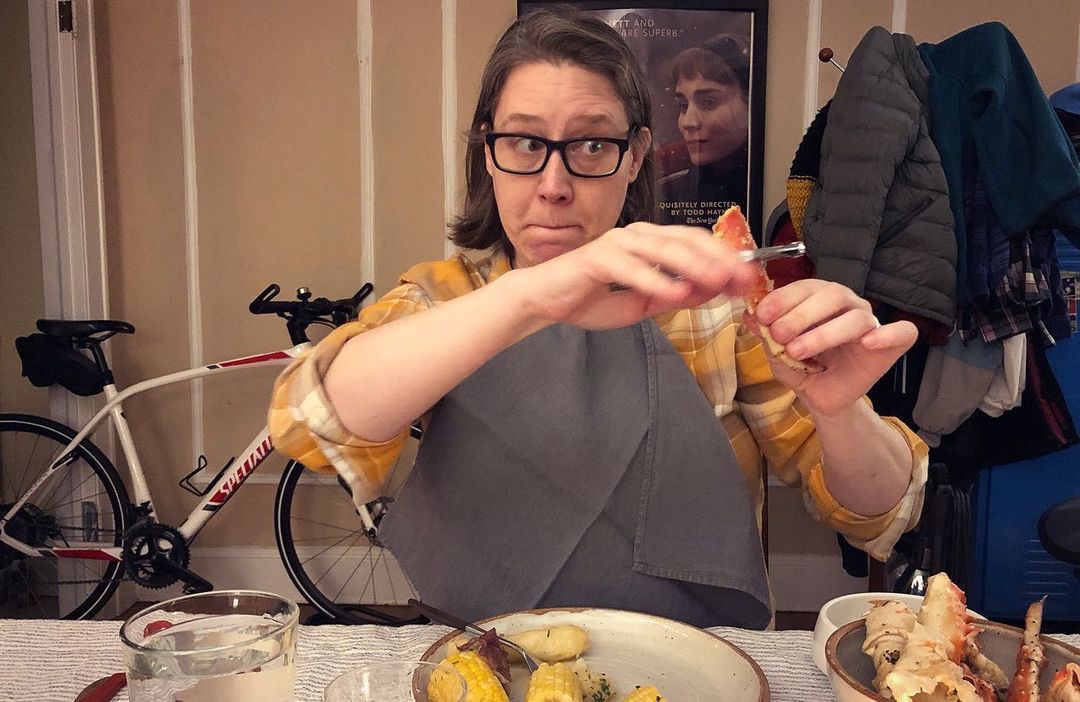
Support Independent Queer Media
We’re raising funds to make it through the end of July. 99% of the people who read this site don’t support. Will you be one of the ones who do? Joining A+ is one of the best ways to support Autostraddle — plus you get access to bonus content while keeping the site 99% free for everyone. Will you join today?



Absolute, definitive proof that love is real and oh, hey, now I’m crying.
this post really makes me believe love is not a lie. i cried
so happy for the both of you
heather – thank you for all of your writing and sharing of your deeply personal experience with covid. its changed how i view the last year, my own identity and so much more…
Heather you have shared so much of yourself with our community and I am so overwhelmed that your person, your love, your sidekick has all of you in ways we do not comprehend and cannot understand. Congratulations to you & Stacy and the cats, with their two mom energy. May each day be filled with small, wonderful moments and steady progressive achievements.
your relationship is beyond couple goals—this is Love goals right here. congrats to you both and thanks for giving the rest of us hope, knowing this kind of Love exists.
This essay is stunning. I love you both very much. <3
I’m not crying everyone else is crying and now I’m crying.
This was so beautifully and lovingly written.
Wow, so beautiful. So much of this resonated and makes me feel “seen”.. Especially the “why me” breakdown & feelings of shame/guilt of being a chronically ill partner. I was diagnosed with epilepsy literally 2 days before I was supposed to go on a first date with a woman who is now my fiancé. My life changed and I’ve been so grateful to her by my side while we attempt to find treatments. We’re in the midst of trying to figure out the details of a wedding too and this essay has been so encouraging. Thank you your vulnerability in sharing such a heartwarming and beauty story.
Honest, brutal, and yet full of hope. I’ve been with my wife now for 22 years this June. We met over the Internet in the summer of ‘99 when we were both 20. It was love at first sight. We went through our own patch where my, at the time untreated, mental illness exploded and I had random outbursts, did dangerous things to myself, and was not a nice person in general. She stood with me though. Made me get help. Never once left my side. I went though another medical issue a few years ago and again, she never left me and supported me fully as I have supported her in her time(s) of need.
We’ve both been lucky that each of us could work from home during COVID. Co-workers and friends ask how we’re doing. They already know we’re two peas in a pod. Honestly? Never better. It made us closer, if possible considering we already finished each other’s thoughts and sentences. Sure we bicker, mostly about what to watch on Netflix or have for dinner (real, life-changing events) and when we are stressed at work we get snippy but it’s ever with or at each other. It’s just happens and then it’s done. We’re at a point now where we say to each other, “You’re being an ass,” then the guilty party apologizes and usually agrees to said ass-dom and then we carry on with what we were doing.
True love, companionship, friendship, and togetherness is possible. We all have our one. I hope all are lucky enough like me, and Heather, to find theirs. Wishing you nothing but the best in love and in health.
Beautiful.
HEATHER WHY WOULD YOU DO THIS TO US 😭😭😭😭😭😭
HEATHER!!!! <3 <3 <3 <3 <3 <3 <3 <3
I started crying from the very start with the scars and DID NOT STOP through this whole beautiful piece of your heart you've shared with us!
Congrats to you & Stacy <3
I can't really put into words how much your writings and sharing of your Long Covid experience has meant to me. I felt so much less alone in my experience knowing it was similar to yours. And the space you make for the grief of it all in what you write is so helpful. Thank you so much! <3
(also on the scar bit, I got SO many scars from small things that just couldn't heal right during that time!)
You are both achingly beautiful.
Heather! 😭😭 this is so so beautiful! Thank you for sharing!!
As a disabled person who has put her wedding off ×3 due to poor health, this shook me and resonated. I am so, so happy for you both.
“Thanks for sharing your story. It seems to me that this is the most honest thing that I have read in the last few years. This is wonderful and it is truly true. I am very sorry that you had to survive the coronavirus and you are still struggling with its consequences. But I am very glad that you have already defeated it. I hope you will recover very soon and feel much better. But no matter what, you stayed together and that’s great. At such a time, support is one of the few that can help out of such a situation. Therefore, I wish you to get better and show everyone that you are strong and you are together.
My website THC Delivery“
thank you, thank you, thank you for sharing so many pieces of yourself and your life with us. the way that you articulate the frustration that so often accompanies chronic illness and changes in health or ability is so spot-on and poignant.
So much love for this piece, Heather.
😭😭😭😭😭😭😭😭😭!!!
Thank you so much for sharing this story. It resonates deeply.
Thank you for sharing your steadfast and remarkable love with us, Heather. My heart feels so full after reading this.
the second i finishing this, i did two things near simultaneously: burst into tears, and breathed out “heather” into my empty apartment in the fondest way.
thank you for sharing yourself with us like this. thank you to stacey for allowing herself to be shared like this. i send you both blessings and all the love in the world.
please forgive my typos i am literally that overwhelmed – finished and stacy!!!!
Wow Heather. I’m not much of a commenter, but this was so moving and it, along with happenings over our past year of lockdown for me is just making me think and feel so much. You know, the ugly crying I can’t see anyone not doing after reading this.
So, at nearly 40, I still live with my parents. Bouts of depression and now chronic pain mean that I have to be careful with how much I work and the stressfulness of it.
My father was diagnosed with a degenerative neurological disease similar to ALS (but not but that-the more I deal with doctors, the more I think everything is a guess and treatment is a crapshoot and who the fuck even knows with really weird shit that maybe doesn’t even have a name).
Slowly over the last 5ish years,he went from not being able to go up stairs, to using a walker, to our pushing him around on a not quite right wheelchair, to a hospital bed and lift because he couldn’t stand even with our help anymore. And added to that, eventually his arms being to weak to feed himself, and dementia, and cancer to top it all off.
It’s funny how everyone is complaining about lockdown now, when I’ve been basically living it for years, except I could (blessedly) go to work and my mother would somehow care for him alone or with minimum help from the region’s homecare psw’s (dear non-Canadians: long term and hospice care, within or outside the “elderly homes” sucks unbelievably bad, and I don’t think I can be friends with people who vote conservative anymore because they keep making it worse).
Anyway, it was hard on me, especially physically with chronic pain, but fuck did my mother do everything for that man. Even though my father was sometimes an asshole to her in life, even through the screaming matches between them in his slightly demented, scared and needy states, even through the modified cancer treatments in an effort to balance the likelyhoods of either disease killing him, even through begging the regional agency to move him up the list for home placement, even though they said my mother would basically have to die for that to be possible, even through the 5 months bouncing around hospitals after one night where we thought ‘this might be it’ and emergency procedures, and finally in a long term care home for the last five months of his life, and the one week of lockdown where they granted her special permission to go feed him, because nerve signals weren’t going to his muscles anymore and it would take 45 minutes to get even a tiny bit of food into him lying in bed, before he would fall asleep because just that was exhausting, before the cancer finally took him.
I think every nurse and psw in the place came to see us, all teary to outright crying, hugging or grasping my mother’s hands (even though we shouldn’t, but we were gowned and gloved and masked for other reasons anyway) and so many said they never knew a spouse as devoted as her.
He died a month after their 40th wedding anniversary, where he was lucid enough to cry one long tear when she wished him a happy one.
I think, that anyone considering getting married needs to think if they are willing to do this. This is what “in sickness and in health” means. I don’t know if it was just because she’s catholic , or really meant those vows, or she really loved him that deeply (even when my relationship with him was complicated, even though I continued to live there despite our own fights), but man, that’s the bar right there. You’re just in the unfortunate circumstance that the bar came into vision even before those vows were said.
And you still said them. And that is fucking everything.
So, I’m almost 40, living with my mother, in a lockdown that is comparatively a piece of cake, mostly because we have each other and the relief that the awfulness of my dad’s illness is over. But I’m fucking terrified of losing her, especially since all those years of taking care of my dad and a pretty serious fender bender means a couple of big surgeries in the coming year or two, if covid ever means they can even happen again with any sort of regularity with a chronically underfunded and serviced hospital system, and my mother doing shit she shouldn’t do because she’s a doer and everything needs to be done right now b/c wtf else is there to do during all this even though she complains about pain later and I say she needs to pay attention to not over do it, and it’s ok to rest and nap and do it tomorrow because wtf else is there to do during all this and it’s not like it or is are going anywhere.
And I’m terrified when inevitably she will go too, and I’ve never really dated let alone done anything else, and don’t know the rules that everyone figured out in their teens and twenties and the revised ones after they get divorced so they can make sure they’re on the same page and if they have the same goals about baby making or just causal fucking, and somehow know via looks I somehow can’t even discern if someone’s into me that way and close friendships ending have messed me up so there’s a certain distance I’ve developed in general, despite writing a short story about my life to strangers on the internet, wherein I’m pretty certain I won’t be able to settle for anything less than someone I can say those vows to, and them to me and it means fucking everything.
Anyway, long time reader, first time (?) commenter who apparently needed to write this stream of consciousness about grief and fear.
Now back to our regularly scheduled mostly-entertainment blog that us romantic shits can’t stop reading because of stuff like this.
Hi JD. Thanks for sharing all this with us. I don’t have any answers for you but I wanted you to know someone read your whole comment and is thinking of you and wishing you and your mother well.
You’re exactly right about knowing what “in sickness and in health” might really mean – *will* really mean for most of us – and choosing to make that commitment anyway. I’ve seen that play out in both sets of grandparents and in my in-laws and when it happens for my husband and me, whichever one of us ends up in whichever role, I will still be delighted to be married to him.
Heather, Stacy, congratulations, so happy for you both.
Incredibly beautiful! Congratulations Stacy & Heather! Love to you both <3 <3
This is really beautiful. Thank you for sharing it with us.
Thank you so much for sharing this Heather. Much love to you and Stacy, and congratulations on getting married <3
Just incredible. 26 years with my beloved, and i feel this so much!
Thank you for writing this Heather! So beautiful and moving! Congratulations to you both!
Oh Heather <3 !!! my heart! you are an amazing writer, and you two have the greatest love – congratulations!! As a disabled person, a lot of what you wrote resonated, even though of course every situation is different. I don't have a lot of relationship experience but the themes that came up hit me right in the feels and resonated with conversations I have had or might be having with future partners, the fears around that – Mia Mingus, a disabled activist, talks about 'access intimacy' the intimacy we feel towards people we feel safe with regarding our needs for accessibility. People who we have this sort of bond with are very special. all the best for you two and your cats.
Hi Heather,
I’ve read a few of your articles that mention your recent health issues and felt compelled to mention this in case it’s any help. I’ve had POTS for years (plus MCAS and hypermobility) but it got really bad a couple of years ago amidst a total health collapse. Anyway, after endless experimentation, here are the things that saved my bacon re: POTS:
– potassium, as much as possible from diet, plus supplementation (they only tell you about salt..)
– grounding (sounds a bit out there, but seriously… look into it) Earthing Institute, Clint Ober. Especially if your POTs is related to exaggerated sympathetic nervous system response
– High dose B1 (thiamine) supplementation. Look up Elliot Overton on Youtube, and Derrick Lonsdale/Chandler Marrs
In 2019 I could hardly be upright at all – and I’ve had it on/off my whole life – and now the POTs is often unnoticeable. Hope you don’t mind me sharing this.
Congrats on your lady-marriage :)
Beautiful piece. Thanks for sharing.
Mental health is an integral part and an essential component of health. The most valuable asset we have is ourselves. Anything that improves our talents and skills is worth doing.